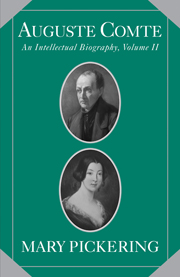Book contents
- Frontmatter
- Contents
- Acknowledgments
- Abbreviations and Notes
- Introduction
- 1 1843–1844: The Battle against the Pedantocracy
- 2 Tensions in Comte's Relationships, 1842–1846
- 3 Clotilde de Vaux and the Initial Encounter with Comte
- 4 The Muse's Tragic End
- 5 Pain and Recognition
- 6 The Revolution of 1848
- 7 Discours sur l'ensemble du positivisme
- 8 Personal and Professional Disappointments
- 9 The Early Development of the Religion of Humanity
- 10 The Development of the Positivist Movement
- Conclusion
- Bibliography
- Index
- References
7 - Discours sur l'ensemble du positivisme
Published online by Cambridge University Press: 06 January 2010
- Frontmatter
- Contents
- Acknowledgments
- Abbreviations and Notes
- Introduction
- 1 1843–1844: The Battle against the Pedantocracy
- 2 Tensions in Comte's Relationships, 1842–1846
- 3 Clotilde de Vaux and the Initial Encounter with Comte
- 4 The Muse's Tragic End
- 5 Pain and Recognition
- 6 The Revolution of 1848
- 7 Discours sur l'ensemble du positivisme
- 8 Personal and Professional Disappointments
- 9 The Early Development of the Religion of Humanity
- 10 The Development of the Positivist Movement
- Conclusion
- Bibliography
- Index
- References
Summary
The mind must always be the minister of the heart, never its slave.
Comte, 1848INTRODUCTION: POSITIVISM AS POLITICS AND AS RELIGION
Comte wrote one important work during the Revolution of 1848, the Discours sur l'ensemble du positivisme, which he had originally hoped to finish in May the year before. He finally started it on January 1, 1848 and completed it on June 18. Less than a week after he finished it, Paris was rocked by the workers' rebellion. Just as the Revolution of 1830 caused delays in the publication of the Cours, the fighting during the “June Days” impeded the appearance of the Discours. Comte gave up finding a publisher and simply engaged a printer for all his remaining works. The Discours was finally printed by E. Thunot on July 29, 1848, thanks to the aid of a subsidy from his positivist disciples in Holland. The volume was four hundred pages and cost six francs. In a slightly modified form, it served as the first part of the first volume of the Système, which was completed in February 1850 but not published until July 1851.
The title Discours sur l'ensemble du positivisme is significant. Comte made a point for the first time of regularly calling his positive philosophy “positivism” to underscore his argument that it was a complete system as well as a political movement.
- Type
- Chapter
- Information
- Auguste ComteAn Intellectual Biography, pp. 335 - 413Publisher: Cambridge University PressPrint publication year: 2009



